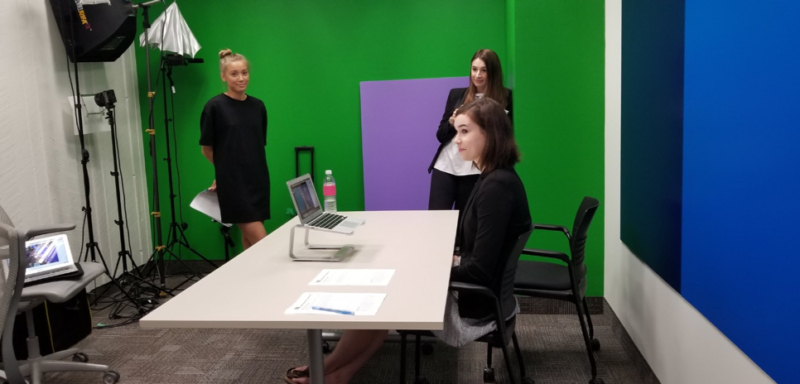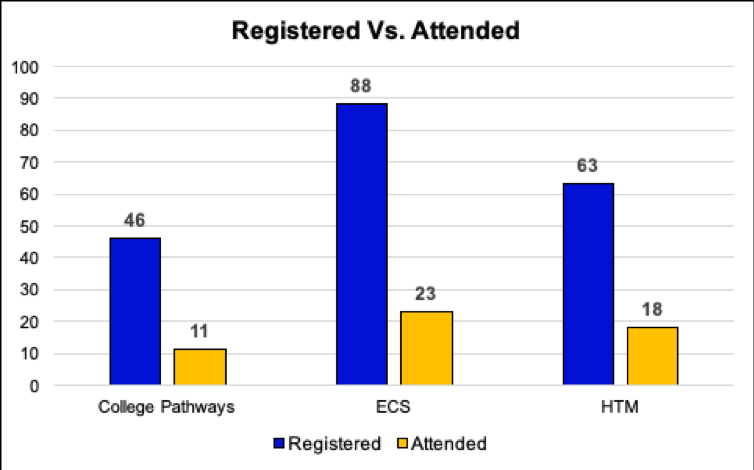Published on July 23, 2019
Written by Kelli Wheatley
Virtual Recruitment Officer, Ryerson University
 Most folks in the #PSEWEB community are familiar with the tried-and-true methods of reaching students online: emails, Facebook, Instagram, Twitter, Snapchat, YouTube, and maybe WeChat (RIP Vine). My team, however, is also fully committed to webinars.
Most folks in the #PSEWEB community are familiar with the tried-and-true methods of reaching students online: emails, Facebook, Instagram, Twitter, Snapchat, YouTube, and maybe WeChat (RIP Vine). My team, however, is also fully committed to webinars.
In my role as a Virtual Recruitment Officer at Ryerson University, I devote time and effort to managing the “RU Live” portfolio. RU Lives are webinars held through Zoom on topics ranging from application processes, audition and portfolio procedures, housing deadlines, course registration and advising, financial assistance opportunities, and international student support. I coordinate and host between 2-8 webinars per month, and while it’s a lot of work to maintain this level of programming, the results are worth it. Here are a few things that our webinars do!

Engage international students
International students love webinars. We consistently see a high level of engagement from students around the globe on this platform. I recently had 180 international students register for a general “Get to Know Ryerson” webinar, and it’s not uncommon for students from 90+ countries to participate over the course of an admissions cycle! With internationalization directives from both the Ontario government and our own institutional leadership, these numbers are really exciting.

I believe webinars are attractive to international students because attendees can remain almost fully anonymous if they choose – and it’s easy and comfortable to sit back, watch people deliver information, and type questions. This format also helps to personalize Ryerson for people around the globe, as webinars give actual human faces to the institution.
Encourage institutional collaboration
In her fabulous keynote at #PSEWEB last year, Amanda Costello highlighted how departmental silos exist at almost every post-secondary institution. Our webinar program has encouraged collaboration across offices and units. I hold webinars with admissions, recruitment, academic programs, international student support, student financial assistance, housing and residence life, academic accommodation support, co-op centres, the first-year engineering office… you get the idea! Once a department has tried it, they’re hooked and asking for more because they realize how easily webinars reach students and applicants. The projects can open a line of communication or strengthen one that already existed.

Collect data
Webinars are a veritable data mine. With Zoom, you can curate your registration questions, and I ask for a student’s name, email, country of citizenship, year they would expect to start at Ryerson, and if they are currently in school. Once the webinar is over, we can see who attended and asked questions. Later, we can see who watched the webinar by logging into the recorded session that’s being housed in the Zoom cloud.

This data helps a lot of people: I can plan more webinars; Recruitment can identify regions of interest; Admissions can determine which programs are getting attention, and every other office can dive into the data for different purposes. In essence, we can see which students are engaging with us, and on which topics – or if students aren’t engaging, which is helpful as well!
Maximize our budgets
Webinars are cost-effective. My office funds our own webinar license within the larger Ryerson Zoom account, and that’s the total cost of reaching thousands of students each year. We all know that recruitment – especially international recruitment – requires a significant investment of resources, but webinars capture new prospective students and continue to nurture applicants and matriculated students without sending folks across the country or the world for every touchpoint.
Compel us to review statistics and strategy
Data-driven decisions are trending for a good reason. When you’re live on a webinar, you can see the number of people participating right there on your screen – and you’re very aware whether you’re encouraging participants to ask more questions, or if you’re struggling to keep up with demand.
It’s also easy to see how your webinar performed with the insights of additional reports (in our case, provided by Zoom). The reports encourage us to review performance and use metrics to determine future planning – and this process is also a great reminder to consistently evaluate and analyze our efforts on all projects.
To conclude, webinars have been a fantastic way for us to reach and connect with students. It has taken trial and error to determine how we can best use the platform – and we continue to evaluate as we go – but the benefits of holding these sessions is clear to us, and we’re going to keep at it as long as we’re seeing results. So… are you as excited about webinars as this student?
